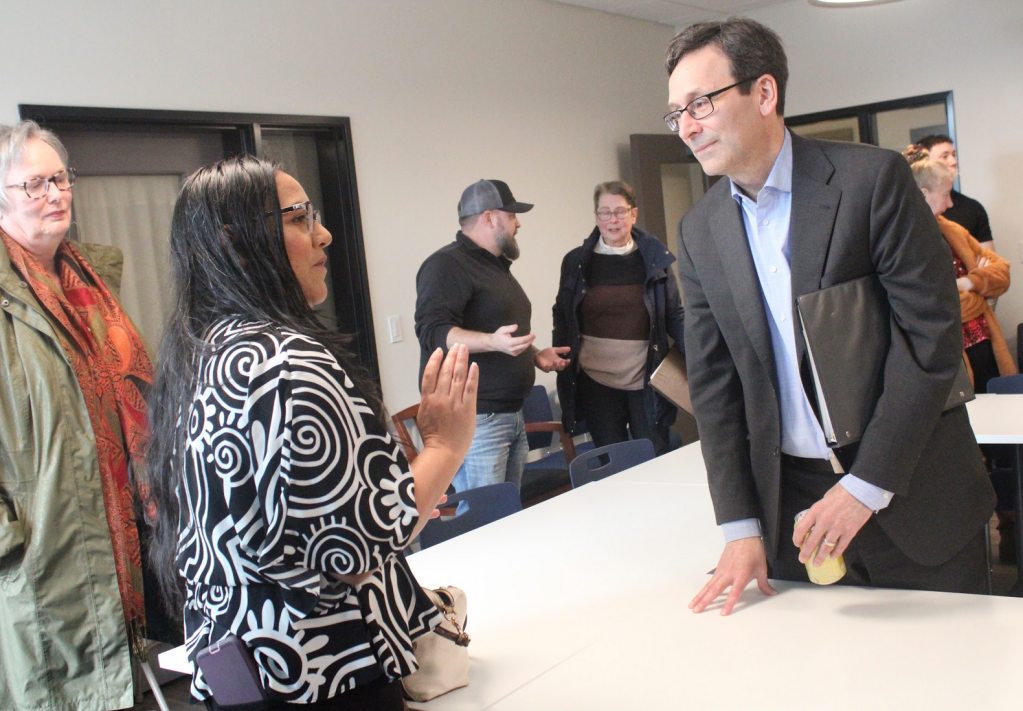Housing takes center stage during governor’s visit: Local leaders detail pressing issues
Published 1:42 pm Tuesday, March 18, 2025

- Fabiola Merino, vice president of Pacific County Immigrant Support, talks with Gov. Bob Ferguson after his meeting with community leaders in Raymond on March 15.
RAYMOND — The south Washington coast was the place to be last weekend — even in spite of typical early spring weather.
Trending
That’s where Gov. Bob Ferguson found himself on Saturday amid a multi-day trip west of Olympia, meeting with about two dozen local officials and community leaders in Raymond Saturday afternoon to discuss issues facing the state and area before participating, as he long has, in the Democrats of Pacific County’s annual crab feed along in South Bend along with a lineup of local, state and federal electeds. (The Observer will have a recap of the March 15 crab feed in next week’s issue.)
“One thing that’s important to me and my team is just getting around to communities all across the state and hearing what their thoughts are, what are the issues [important to them],” Ferguson, who previously served 12 years as the state’s attorney general, said inside a crowded Willapa Center conference room.
While tackling statewide issues is on Ferguson’s mind, so too he said is helping communities address more hyper-local issues, whether it’s helping a project that’s being held up by a permitting issue move forward or securing needed state funding.
Trending
“My approach is I like solving problems. I’m just big into that and my team knows that about me,” Ferguson said. “We face some challenges as a state that are intractable in some ways, where you’re just trying to make progress. We’re not going to solve homelessness in a day, a week, a month or a year, we know that, but we’re going to try and make progress on those issues — or the opioid epidemic, the same thing. But there are lots of issues we face as a state where we can actually solve them.”
He cited last week’s announcement that the state would be pitching in more than $600,000 to help repair the only access road to the Hoh Rain Forest in the Olympic National Park, which has been closed since December due to a washout. The rainforest saw more than 450,000 visitors last year, and Jefferson County did not have the funding available for the repairs before the start of the crucial summer tourism season.
Housing, housing, housing
Perhaps unsurprisingly, the issue touched on most frequently throughout the meeting was housing, whether it be affordability, availability or rising associated costs.
For Ferguson, it’s a topic that’s been raised in virtually every meeting and event he’s held throughout the state both during his gubernatorial campaign and since being sworn into office in January. With it being an issue touching every corner of the state, he’s hopeful that legislators in both parties will be motivated to put forward and support potential solutions in this year’s session.
“We’ve got a crisis on needing more housing and more affordable housing — housing of all kinds, really, but more affordable housing for sure,” the governor said. “The hundreds and hundreds of thousands of units of all kinds that we’re going to need to get constructed in a short period of time is going to be a big challenge for us.”
Upon taking office on Jan. 15, Ferguson issued an executive order directing state agencies to review all regulations that impact housing, permitting and construction and to identify provisions that can be sped up, deferred or eliminated.
Rebecca Chaffee, who serves on the board of the Joint Pacific County Housing Authority and is co-founder of the Willapa Community Development Association, highlighted the yearslong effort to win state and federal funding to transform the American Legion building in Raymond to provide housing for veterans and offer community resources.
Supported by WCDA, the project has secured some $14 million in recent years, but Chaffee said the price keeps going up and a capital budget request for another $1 million is pending as the legislature continues work on the upcoming two-year budget. Another $250,000 could be included in the 2025 federal budget as part of a congressionally directed spending request by U.S. Rep. Marie Gluesenkamp Perez, but the six-month continuing resolution that was passed and signed into law last week would delay those funds from being awarded even longer.
“We’ve got a lot going on, and affordable housing is right there at the top of the list,” Chaffee said.
Another housing-adjacent issue facing Raymond and South Bend homeowners and renters is the condition of the cities’ joint sewer treatment plant, South Bend Mayor Julie Struck told Ferguson. The plant is in “desperate need” of repairs to address sinking concerns, carrying an estimated cost of $10 million that Struck said would be a backbreaker for households that are already paying upward of $300 per month for water and sewer services.
Budget challenges
Just a couple of months into his four-year term since being elected last November, much of Ferguson’s attention has been devoted to the ongoing legislative session and the state’s operating budget, which is facing a projected shortfall of $12 billion to $15 billion over the next four years.
“The state is facing a real budget challenge right now, and that’s putting it mildly,” Ferguson said. “The state, by law, must balance our budget. We don’t get to do what the [federal government] can do, we’ve gotta balance our budget each time.”
The governor proposed $4 billion in budget cuts in late February, which would include measures such as one furlough day per month for most state workers and eliminating the equivalent of about 1,000 full-time employees through attrition and cutting vacant or new positions. He also came out in favor of an additional $3 billion in savings that had been identified by former Gov. Jay Inslee in late 2024 — still leaving a gap of at least $5 billion if all of the cuts are implemented in the forthcoming two-year budget.
State financial support for food banks is one such area that would be scaled back from levels in recent years if Ferguson’s recommendations are incorporated into the final budget, which would follow on the heels of recent cuts at the federal level. The U.S. Department of Agriculture canceled a program for 2025 that supports food banks in purchasing food from local growers, and would have allocated $500 million to food banks throughout the country.
Sandy Bell, president of the Tokeland Food Bank, noted the food bank has partnerships with Coastal Harvest in Hoquiam, which told them just last week that the Washington State Department of Agriculture’s federal funding for its food bank assistance program was being cut.
“That will cut funds for [Coastal Harvest] to actually purchase local fruits and vegetables from Washington growers, which seems like a double-whammy,” Bell said.
WSDA received $128 million in one-time funding from the federal government during the pandemic for its program that provides assistance to food banks. The legislature has since invested significant state dollars to fill the gap left by that loss of funding, but Ferguson has proposed limiting the program’s general fund investment to $82 million in the next budget — although still up from the $12 million that the program received as late as 2019.
“I’m confident our investment, wherever we end up in the budget, will still be significantly more than where it was just a handful of years ago,” said Ferguson. “I realize that’s a small consolation if there are these cuts coming on the federal side as well.”
‘Challenging budget’
Decisions that are made in D.C. could also impact the state’s budget and other key programs like Apple Health, Washington’s Medicaid program that provides health insurance at a free or reduced cost to qualifying low-income adults, children and families. Legislation being pursued in Congress could cut hundreds of billions of dollars to Medicaid programs nationwide, and Ferguson calculated that about 70% of funding for the state’s Medicaid program comes from the federal government.
“We have what I would describe currently as a supremely challenging budget situation with a [potential] $15 billion budget shortfall,” said Ferguson. “And, just being honest with you all, if certain things happen with the federal government withholding funds to us, that could move from being very, very serious and challenging to, you know, choose your word — dire.
“I mean [it would be] really, really tough at that point. So we’re trying to balance the budget but also prepare best we can for what might be coming there.”









